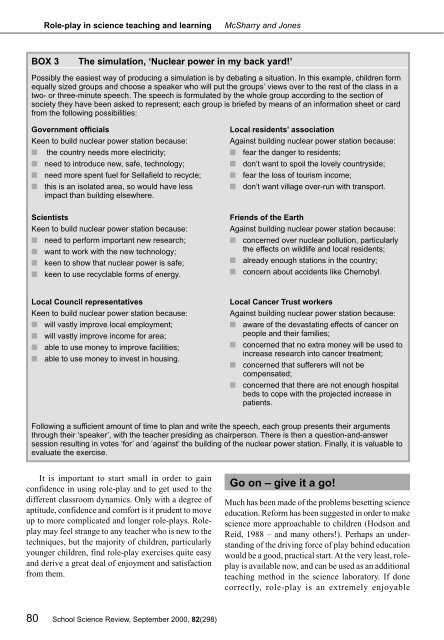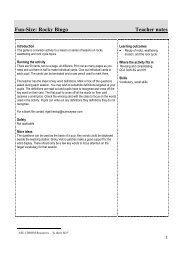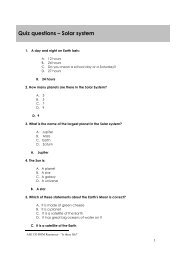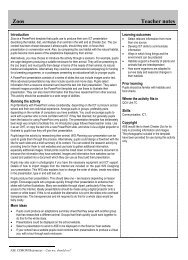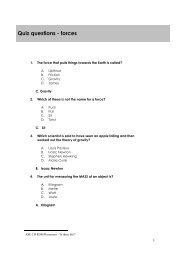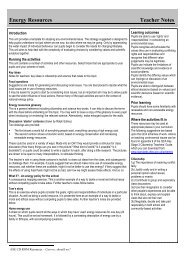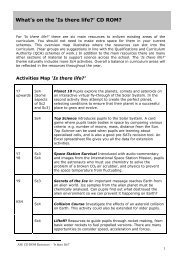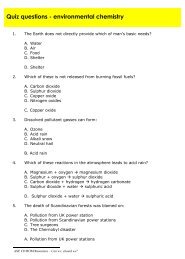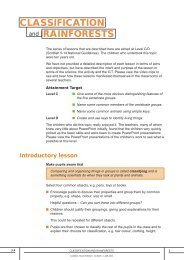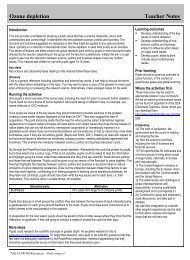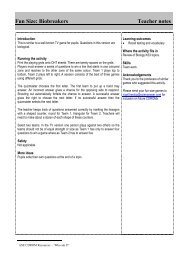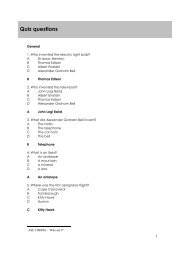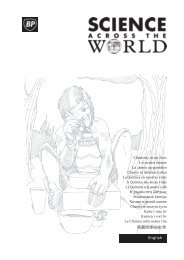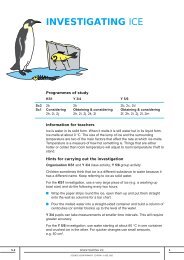Role-play in science teaching and learning - ASE Science Year CD ...
Role-play in science teaching and learning - ASE Science Year CD ...
Role-play in science teaching and learning - ASE Science Year CD ...
Create successful ePaper yourself
Turn your PDF publications into a flip-book with our unique Google optimized e-Paper software.
<strong>Role</strong>-<strong>play</strong> <strong>in</strong> <strong>science</strong> teach<strong>in</strong>g <strong>and</strong> learn<strong>in</strong>g<br />
McSharry <strong>and</strong> Jones<br />
BOX 3<br />
The simulation, ‘Nuclear power <strong>in</strong> my back yard!’<br />
Possibly the easiest way of produc<strong>in</strong>g a simulation is by debat<strong>in</strong>g a situation. In this example, children form<br />
equally sized groups <strong>and</strong> choose a speaker who will put the groups’ views over to the rest of the class <strong>in</strong> a<br />
two- or three-m<strong>in</strong>ute speech. The speech is formulated by the whole group accord<strong>in</strong>g to the section of<br />
society they have been asked to represent; each group is briefed by means of an <strong>in</strong>formation sheet or card<br />
from the follow<strong>in</strong>g possibilities:<br />
Government officials<br />
Keen to build nuclear power station because:<br />
■ the country needs more electricity;<br />
■ need to <strong>in</strong>troduce new, safe, technology;<br />
■ need more spent fuel for Sellafield to recycle;<br />
■ this is an isolated area, so would have less<br />
impact than build<strong>in</strong>g elsewhere.<br />
Local residents’ association<br />
Aga<strong>in</strong>st build<strong>in</strong>g nuclear power station because:<br />
■ fear the danger to residents;<br />
■ don’t want to spoil the lovely countryside;<br />
■ fear the loss of tourism <strong>in</strong>come;<br />
■ don’t want village over-run with transport.<br />
Scientists<br />
Keen to build nuclear power station because:<br />
■ need to perform important new research;<br />
■ want to work with the new technology;<br />
■ keen to show that nuclear power is safe;<br />
■ keen to use recyclable forms of energy.<br />
Friends of the Earth<br />
Aga<strong>in</strong>st build<strong>in</strong>g nuclear power station because:<br />
■ concerned over nuclear pollution, particularly<br />
the effects on wildlife <strong>and</strong> local residents;<br />
■ already enough stations <strong>in</strong> the country;<br />
■ concern about accidents like Chernobyl.<br />
Local Council representatives<br />
Keen to build nuclear power station because:<br />
■ will vastly improve local employment;<br />
■ will vastly improve <strong>in</strong>come for area;<br />
■ able to use money to improve facilities;<br />
■ able to use money to <strong>in</strong>vest <strong>in</strong> hous<strong>in</strong>g.<br />
Local Cancer Trust workers<br />
Aga<strong>in</strong>st build<strong>in</strong>g nuclear power station because:<br />
■ aware of the devastat<strong>in</strong>g effects of cancer on<br />
people <strong>and</strong> their families;<br />
■ concerned that no extra money will be used to<br />
<strong>in</strong>crease research <strong>in</strong>to cancer treatment;<br />
■ concerned that sufferers will not be<br />
compensated;<br />
■ concerned that there are not enough hospital<br />
beds to cope with the projected <strong>in</strong>crease <strong>in</strong><br />
patients.<br />
Follow<strong>in</strong>g a sufficient amount of time to plan <strong>and</strong> write the speech, each group presents their arguments<br />
through their ‘speaker’, with the teacher presid<strong>in</strong>g as chairperson. There is then a question-<strong>and</strong>-answer<br />
session result<strong>in</strong>g <strong>in</strong> votes ‘for’ <strong>and</strong> ‘aga<strong>in</strong>st’ the build<strong>in</strong>g of the nuclear power station. F<strong>in</strong>ally, it is valuable to<br />
evaluate the exercise.<br />
It is important to start small <strong>in</strong> order to ga<strong>in</strong><br />
confidence <strong>in</strong> us<strong>in</strong>g role-<strong>play</strong> <strong>and</strong> to get used to the<br />
different classroom dynamics. Only with a degree of<br />
aptitude, confidence <strong>and</strong> comfort is it prudent to move<br />
up to more complicated <strong>and</strong> longer role-<strong>play</strong>s. <strong>Role</strong><strong>play</strong><br />
may feel strange to any teacher who is new to the<br />
techniques, but the majority of children, particularly<br />
younger children, f<strong>in</strong>d role-<strong>play</strong> exercises quite easy<br />
<strong>and</strong> derive a great deal of enjoyment <strong>and</strong> satisfaction<br />
from them.<br />
Go on – give it a go!<br />
Much has been made of the problems besett<strong>in</strong>g <strong>science</strong><br />
education. Reform has been suggested <strong>in</strong> order to make<br />
<strong>science</strong> more approachable to children (Hodson <strong>and</strong><br />
Reid, 1988 – <strong>and</strong> many others!). Perhaps an underst<strong>and</strong><strong>in</strong>g<br />
of the driv<strong>in</strong>g force of <strong>play</strong> beh<strong>in</strong>d education<br />
would be a good, practical start. At the very least, role<strong>play</strong><br />
is available now, <strong>and</strong> can be used as an additional<br />
teach<strong>in</strong>g method <strong>in</strong> the <strong>science</strong> laboratory. If done<br />
correctly, role-<strong>play</strong> is an extremely enjoyable<br />
80 School <strong>Science</strong> Review, September 2000, 82(298)


